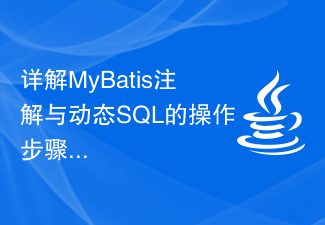 Backend Development
Backend Development Python Tutorial
Python Tutorial Shortcuts to Python database operations: avoid detours and reach the peak of database operations
Shortcuts to Python database operations: avoid detours and reach the peak of database operations
When using python to perform database operations, we often encounter some common errors and problems. These errors and problems not only affect the quality and operating efficiency of the code, but also make it difficult to debug and maintain. To help you avoid these problems, this article will provide some valuable tips and tricks to help you improve your database operational skills, thereby improving work efficiency and project quality.
- Use parameterized queries to avoid sql injection attacks. A SQL injection attack is a common security vulnerability that allows an attacker to access or corrupt a database by injecting malicious code into a SQL query. To prevent SQL injection attacks, SQL statements should be constructed using parameterized queries. Parameterized queries can prevent attackers from injecting malicious code into SQL statements, thereby ensuring database security.
import Mysql.connector
# 建立数据库连接
connection = mysql.connector.connect(host="localhost",
database="mydb",
user="user",
passWord="password")
# 创建游标
cursor = connection.cursor()
# 使用参数化查询来查询数据
sql = "SELECT * FROM users WHERE username=%s"
param = ("john",)
# 执行查询
cursor.execute(sql, param)
# 获取查询结果
result = cursor.fetchall()
# 打印查询结果
for row in result:
print(row)
# 关闭游标和数据库连接
cursor.close()
connection.close()
- Use Transactions to ensure data consistency.
A transaction is an atomic sequence of operations that either completes successfully or is completely rolled back. Using transactions ensures data consistency even in the presence of errors or system failures. In Python, you can use the
withstatement to manage transactions.
import mysql.connector
# 建立数据库连接
connection = mysql.connector.connect(host="localhost",
database="mydb",
user="user",
password="password")
# 创建游标
cursor = connection.cursor()
# 启动事务
cursor.start_transaction()
try:
# 执行SQL语句
sql = "UPDATE users SET balance=balance+100 WHERE username=%s"
param = ("john",)
cursor.execute(sql, param)
# 提交事务
connection.commit()
except:
# 回滚事务
connection.rollback()
# 关闭游标和数据库连接
cursor.close()
connection.close()
- Use connection pooling to improve the performance of database connections.
Connection pooling is a pre-created database connection pool that improves the performance of database connections. In Python, you can use the
ConnectionPoolclass in thepymysqllibrary to create a connection pool.
from pymysql import ConnectionPool
# 创建连接池
connection_pool = ConnectionPool(host="localhost",
database="mydb",
user="user",
password="password",
max_connections=5)
# 获取连接
connection = connection_pool.get_connection()
# 创建游标
cursor = connection.cursor()
# 执行SQL语句
sql = "SELECT * FROM users WHERE username=%s"
param = ("john",)
cursor.execute(sql, param)
# 获取查询结果
result = cursor.fetchall()
# 打印查询结果
for row in result:
print(row)
# 关闭游标和连接
cursor.close()
connection.close()
- Use ORMFramework to simplify database operations.
The ORM framework is an object-relational mapping framework that maps data in relational databases to Python objects. Using an ORM framework can simplify database operations and improve code readability and maintainability. In Python, you can use the
sqlalchemylibrary to use the ORM framework.
from sqlalchemy import create_engine, Column, Integer, String
from sqlalchemy.orm import sessionmaker
from sqlalchemy.ext.declarative import declarative_base
# 创建引擎
engine = create_engine("mysql+pymysql://user:password@localhost/mydb")
# 创建会话
Session = sessionmaker(bind=engine)
session = Session()
# 定义模型
Base = declarative_base()
class User(Base):
__tablename__ = "users"
id = Column(Integer, primary_key=True)
username = Column(String(20))
balance = Column(Integer)
# 查询数据
user = session.query(User).filter_by(username="john").first()
# 更新数据
user.balance += 100
session.commit()
# 关闭会话
session.close()
- Back up the database regularly to prevent data loss.
Regularly backing up your database can prevent data loss. In Python, you can use the
mysqldumpcommand to back up the database.
mysqldump -u user -p password mydb > backup.sql
The above is the detailed content of Shortcuts to Python database operations: avoid detours and reach the peak of database operations. For more information, please follow other related articles on the PHP Chinese website!
 iBatis与MyBatis:比较与优势剖析Feb 18, 2024 pm 01:53 PM
iBatis与MyBatis:比较与优势剖析Feb 18, 2024 pm 01:53 PMiBatis和MyBatis:区别和优势解析导语:在Java开发中,持久化是一个常见的需求,而iBatis和MyBatis是两个广泛使用的持久化框架。虽然它们有很多相似之处,但也有一些关键的区别和优势。本文将通过详细分析这两个框架的特性、用法和示例代码,为读者提供更全面的了解。一、iBatis特性:iBatis是目前较为老旧的持久化框架,它使用SQL映射文件
 详解MyBatis注解与动态SQL的操作步骤Feb 18, 2024 pm 03:29 PM
详解MyBatis注解与动态SQL的操作步骤Feb 18, 2024 pm 03:29 PMMyBatis注解动态SQL的使用方法详解IntroductiontotheusageofMyBatisannotationdynamicSQLMyBatis是一个持久层框架,为我们提供了便捷的持久化操作。在实际开发中,通常需要根据业务需求来动态生成SQL语句,以实现灵活的数据操作。MyBatis注解动态SQL正是为了满足这一需求而设计的,本
 MySQL如何声明变量Feb 18, 2024 pm 01:53 PM
MySQL如何声明变量Feb 18, 2024 pm 01:53 PMMySQL是一种常用的关系型数据库管理系统,它支持变量的定义和使用。在MySQL中,我们可以使用SET语句来定义变量,并使用SELECT语句来使用已定义的变量。下面将通过具体的代码示例来介绍如何在MySQL中进行变量的定义和使用。首先,我们需要连接到MySQL数据库。可以使用以下命令连接到MySQL数据库:mysql-u用户名-p密码接下来,我们可以
 Linux性能调优~Feb 12, 2024 pm 03:30 PM
Linux性能调优~Feb 12, 2024 pm 03:30 PMLinux操作系统是一个开源产品,它也是一个开源软件的实践和应用平台。在这个平台下,有无数的开源软件支撑,如apache、tomcat、mysql、php等。开源软件的最大理念是自由和开放。因此,作为一个开源平台,linux的目标是通过这些开源软件的支持,以最低廉的成本,达到应用最优的性能。谈到性能问题,主要实现的是linux操作系统和应用程序的最佳结合。一、性能问题综述系统的性能是指操作系统完成任务的有效性、稳定性和响应速度。Linux系统管理员可能经常会遇到系统不稳定、响应速度慢等问题,例如
 如何解决 Golang 中的错误“ORA-00911:无效字符”?Feb 08, 2024 pm 09:39 PM
如何解决 Golang 中的错误“ORA-00911:无效字符”?Feb 08, 2024 pm 09:39 PM我在调用以下函数时遇到错误“ORA-00911:无效字符”。如果我使用带有硬编码值的SQL查询(截至目前,它已在下面的代码片段中注释掉),那么我可以在邮递员中以JSON响应获取数据库记录,没有任何问题。所以,看起来我的论点做错了。仅供参考,我正在使用“github.com/sijms/go-ora/v2”包连接到oracledb。另外,“DashboardRecordsRequest”结构位于数据模型包中,但我已将其粘贴到下面的代码片段中以供参考。请注意,当我进行POC时,我们将使用存
 深入了解MyBatis标签:掌握MyBatis常用标签的功能和用法Feb 18, 2024 pm 03:43 PM
深入了解MyBatis标签:掌握MyBatis常用标签的功能和用法Feb 18, 2024 pm 03:43 PMMyBatis标签详解:掌握MyBatis中各种常用标签的功能与用法,需要具体代码示例引言:MyBatis是一个强大且灵活的Java持久化框架,广泛应用于Java开发中。了解MyBatis标签的功能和用法对于使用MyBatis进行数据库操作非常重要。本文将详细介绍MyBatis中几个常用的标签,并提供相应的代码示例。一、select标签select标签用于执
 比较JPA和MyBatis:如何确定最适合的持久化框架?Feb 18, 2024 pm 02:12 PM
比较JPA和MyBatis:如何确定最适合的持久化框架?Feb 18, 2024 pm 02:12 PMJPAvsMyBatis:如何选择最佳的持久化框架?引言:在现代软件开发中,使用持久化框架来处理数据库操作是必不可少的。JPA(Java持久化API)和MyBatis是两个常用的持久化框架。然而,如何选择最适合你的项目的持久化框架是一个具有挑战性的任务。本文将分析JPA和MyBatis的特点,并提供具体的代码示例,帮助你做出更明智的选择。JPA的特点:J
 备份数据库的sql语句有哪些Sep 18, 2023 am 11:26 AM
备份数据库的sql语句有哪些Sep 18, 2023 am 11:26 AM备份数据库的sql语句有mysqldump命令、pg_dump命令、expdp命令、BACKUP DATABASE命令、mongodump命令和redis-cli命令。


Hot AI Tools

Undresser.AI Undress
AI-powered app for creating realistic nude photos

AI Clothes Remover
Online AI tool for removing clothes from photos.

Undress AI Tool
Undress images for free

Clothoff.io
AI clothes remover

AI Hentai Generator
Generate AI Hentai for free.

Hot Article

Hot Tools

Zend Studio 13.0.1
Powerful PHP integrated development environment

EditPlus Chinese cracked version
Small size, syntax highlighting, does not support code prompt function

Dreamweaver Mac version
Visual web development tools

Atom editor mac version download
The most popular open source editor

mPDF
mPDF is a PHP library that can generate PDF files from UTF-8 encoded HTML. The original author, Ian Back, wrote mPDF to output PDF files "on the fly" from his website and handle different languages. It is slower than original scripts like HTML2FPDF and produces larger files when using Unicode fonts, but supports CSS styles etc. and has a lot of enhancements. Supports almost all languages, including RTL (Arabic and Hebrew) and CJK (Chinese, Japanese and Korean). Supports nested block-level elements (such as P, DIV),





